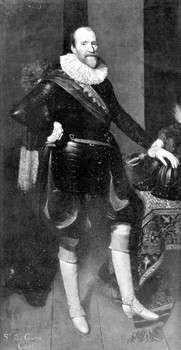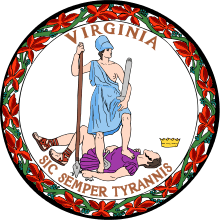Thomas Gates (governor)
| Sir Thomas Gates | |
|---|---|
 | |
| Died |
1622 Netherlands |
| Known for | Colonial governor of Virginia |
Sir Thomas Gates (fl. 1585–1622), was the governor of Jamestown, in the English colony of Virginia (now the Commonwealth of Virginia, part of the United States of America). His predecessor, George Percy, through inept leadership, was responsible for the lives lost during the period called the Starving Time. The English-born Gates arrived to find a few surviving starving colonists commanded by Percy, and assumed command. Gates ruled with deputy governor Sir Thomas Dale. Their controlled, strict methods helped the early colonies survive. However, they did not assist in making them thrive.
Gates was appointed by the Virginia Company of London, which had established the Jamestown settlement under a Royal Charter for the colonisation of Virginia. He had sailed for Jamestown in 1609, aboard the Sea Venture, the new flagship of the Virginia Company. The Sea Venture was part of the Third Supply, a fleet of seven ships, towing two pinnacles, which was intended to deliver new settlers and desperately needed supplies.
At sea, the ships of the Third Supply were separated by a three-day storm now thought to have been a large hurricane. The Admiral of the Virginia Company, Sir George Somers, had taken the helm to fight the storm, and deliberately drove the ship onto rocks to prevent its foundering. The rocks proved to be the reef line to the east of the uninhabited archipelago now known as Bermuda. The other ships went on to Jamestown, not knowing the fate of the Sea Venture.
The 150 survivors spent the next ten months in Bermuda building two new ships on which to complete the journey to Jamestown. Two factions developed, however, due to a dispute between Gates and Somers over who was now the superior. As an appointed officer for Jamestown, Gates felt he was in authority, now that they were ashore. Somers felt that he retained authority until the settlers, including Gates, were landed at Jamestown. The two new ships, the Deliverance and the Patience were completed and sailed for Virginia in 1610. They left two men (a third would be left when the Patience returned from Jamestown) to maintain their claim of Bermuda for England. The Charter of the Virginia Company would officially be extended to include Bermuda in 1612.
After Samuel Argall kidnapped Pocahontas in April 1613, Gates was fearful of reprisal from Chief Powhatan, and turned the Algonquian princess over to Dale in Henricus. She met John Rolfe during her captivity three months later. Reverend Alexander Whitaker converted Pocahontas to Christianity. She adopted the name "Rebecca".
Ever since, Bermuda has also been known officially as The Somers Isles. Sir Thomas Gates left his own name on a part of the colony, Gate's Bay, where the survivors of the Sea Venture landed. The oldest surviving fort in Bermuda, built between 1612 and 1615, is known as Gate's Fort.
Sir Thomas Gates had a cross erected before leaving Bermuda, on which was a copper tablet inscribed in Latin and English:
In Memory of our deliverance both from the Storme and the Great leake wee have erected this cross to the honour of God. It is the Spoyle of an English Shippe of 300 tonnes called SEA VENTURE bound with seven others (from which the storme divided us) to Virginia or NOVA BRITANIA in America. In it were two Knights, Sir Thomas Gates, Knight Governor of the English Forces and Colonie there: and Sir George Somers, Knight Admiral of the Seas. Her Captain was Christopher Newport. Passengers and mariners she had beside (which all come to safety) one hundred and fiftie. Wee were forced to runne her ashore(by reason of her leake) under a point that bore South East from the Northerne Point of the Island which wee discovered first on the eighth and twentieth of July 1609.
Many scholars believe Gates' accounts inspired William Shakespeare's comedy The Tempest.[1]
On reaching Jamestown, only 60 of the 500 settlers previously landed there were found alive through the winter of 1609–1610 which became known as the "Starving Time". The condition of the settlement was so poor that it was decided to abandon it and return everyone to England. However, the timely arrival of another relief fleet under Lord De La Warr gave the colony a reprieve.
Gates' actions as governor were recorded by his secretary William Strachey, and were later published as the book "A True Reportory of the wracke, and redemption of Sir THOMAS GATES, Knight."
Gates would go on to establish at least three new forts along the James River, as well as blockhouses, a wharf, and a governors house. Gates would also lead an armed force against the Powhatans, defeating them, and establishing the first permanent English colony outside of Jamestown, called Henricus. Gates' actions caused him to be considered a national hero upon his return to England, something the Virginia Company badly needed due to their previous dip in investors. Gates was outspoken in support of future expeditions to the New World, and warned his superiors that the colonies would fail without proper supplies. In November 1619, the Virginia Company's new treasurer, Sir Edwin Sandys, praised Gates' "Wisdom, industry, and valour, accompanied with exceeding paines and patience, in the midst of many difficulties."
Gates died in the Netherlands sometime before September 7, 1622. Sir Dudley Carleton was quoted, saying that Gates was "an ancient honest gentleman of this nation." Gates had five children at his death, Thomas, Anthony, Margaret, Mary, and Elizabeth.
Gates Bay in Bermuda is named in his honor, and is purportedly the bay where the Sea Venture landed. Gates Fort, also named in his honor, is a point of interest in St. George, Bermuda.
References
Source used: America: Past and Present (Revised Seventh Edition, AP* Edition).
- ↑ Shakespeare's Caliban: a cultural history By Alden T. Vaughan, Virginia Mason Vaughan, pp38-39
External links
- Genealogy Magazine Bermuda’s Immigrants to the Colonies.
- Bermuda Online Bermudian Forts.
- Experience Bermuda Saint George's.
- www.encyclopediavirginia.org
| Government offices | ||
|---|---|---|
| Preceded by George Percy |
Colonial governor of Virginia 1610 |
Succeeded by Baron De La Warr |
| Preceded by Thomas Dale |
Colonial governor of Virginia 1611-1614 |
Succeeded by Thomas Dale |
